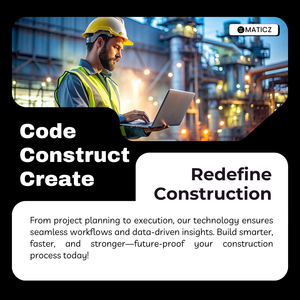The Future of Construction Software: What to Expect in 2025
Corps
The Future of Construction Software: What to Expect in 2025
The construction industry is undergoing a tech revolution, with software playing a pivotal role in shaping the future of project management, design, and execution. By 2025, advancements in construction software will redefine efficiency, collaboration, and sustainability. Here's what to expect:
1. AI and Machine Learning Integration
Artificial Intelligence (AI) and machine learning are transforming construction workflows. By 2025, expect construction software to leverage AI for predictive analytics—accurately forecasting project timelines, budgets, and risks. Machine learning will optimize resource allocation and improve quality control by identifying patterns in data that humans might miss.
Key Applications:
- Real-time risk management and safety predictions.
- Automated scheduling based on historical project performance.
- Enhanced equipment maintenance through predictive diagnostics.
2. Cloud-Based Collaboration and Real-Time Data Sharing
The rise of remote and hybrid work has amplified the demand for cloud-based construction platforms. In 2025, construction software will prioritize seamless collaboration, allowing teams to access and update project data in real-time from anywhere.
Benefits:
- Streamlined communication across teams and stakeholders.
- Instant updates to design models and project timelines.
- Reduction in errors due to outdated information.
3. Building Information Modeling (BIM) Advancements
Building Information Modeling (BIM) is becoming the gold standard in construction design and project management. By 2025, BIM tools will likely incorporate advanced 5D capabilities (cost and time integration) to enhance project visualization and planning.
Innovations to Watch:
- AI-enhanced BIM for automated clash detection and design optimization.
- Greater integration with IoT sensors for real-time updates on structural health.
- Sustainability-focused BIM to model energy efficiency and environmental impact.
4. Augmented and Virtual Reality (AR/VR) for Immersive Design
AR and VR tools are set to revolutionize pre-construction processes by 2025. These technologies will enable immersive project walkthroughs, improving client understanding and team alignment on designs.
Predicted Uses:
- On-site AR overlays for precise alignment and installation.
- VR for training construction teams in safe practices.
- Enhanced client presentations with interactive 3D models.
5. Focus on Sustainability and Green Construction
Environmental concerns are driving the adoption of sustainable practices in construction. By 2025, expect software solutions to incorporate sustainability metrics, helping companies track carbon footprints, optimize material use, and meet green building certifications.
Features in Demand:
- AI-driven tools for selecting eco-friendly materials.
- Lifecycle assessment modules to predict a building's environmental impact.
- Integration with renewable energy design platforms.
6. Automation and Robotics Integration
Software solutions will increasingly integrate with robotic systems, automating repetitive tasks like bricklaying and concrete pouring. Advanced software will coordinate these systems, ensuring efficiency and safety on-site.
Examples:
- Robotic fleet management dashboards.
- Software-controlled 3D printing for construction components.
- AI-powered inspection drones for quality control.
7. Enhanced Cybersecurity Measures
As construction projects rely more on digital tools, cybersecurity will take center stage. Expect advanced encryption, AI-based threat detection, and secure cloud platforms to protect sensitive project data.
Final Thoughts
By 2025, construction software will be smarter, more collaborative, and sustainability-focused, driving unparalleled growth in the industry. Companies that adopt these technologies early will lead the way, setting new benchmarks for efficiency and innovation. Whether it's AI-powered tools or immersive VR experiences, the future of construction software development is nothing short of transformative. Are you ready for the revolution?






commentaires